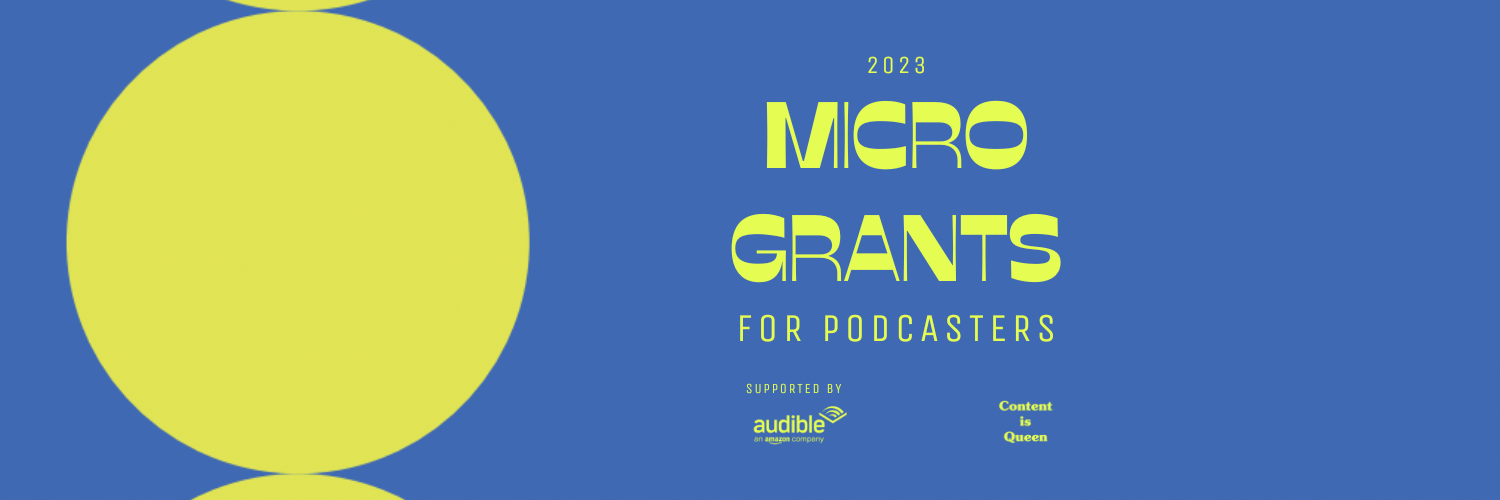*****APPLICATIONS CLOSED*****
We’re thrilled to unveil the next chapter of our Micro-Grants for Podcasters Programme, now welcoming applications from creators around the globe. This initiative allows you to overcome obstacles in turning your podcast ideas into reality. Whether you plan to create a captivating trailer, launch an original pilot, or produce a standout episode for an existing series, this grant is tailored for you.
Here’s what’s new:

Receive a Cash Grant
We’re awarding 20 creators with cash grants up to £1000 aimed at helping you develop trailers, original pilots, or special episodes within your existing series.

Production Support
The selected creators will receive production support from Content is Queen. You’ll have access to our studios, producers and editors, and Epidemic Sound library.

Pitch to Audible
Creators will have the opportunity to pitch their show to Audible for commissioning and further development.
Who can apply
- Individuals based anywhere in the world.
- New or existing podcasters.
- Disabled individuals.
- Racialised individuals.
- LGBTQIA+ community members.
- Those from low-income backgrounds.
- Applicants must be 18 or older.
Who can’t apply
Registered commercial businesses or organisations with over ten employees or turnover greater than £50k. Schools or charities.
Terms and Conditions
- Application Window: Opens on Monday 2nd October at 10:00AM BST and closes on 13th November 2023 6:00PM GMT.
- Successful applicants will be informed by 9th February 2024. *Delayed until 16th February 2024*
- Commitment: A minimum of 1 hour per week for production calls.
- Payment: Successful UK applicants must be able to supply a UK Bank account in the lead applicant’s name. For international applicants, you must have an active and valid PayPal account that matches the name and email on the grant application. We will not make payments to bank accounts/PayPal with mismatched names or details. If the applicant is unable to provide a valid payment account within 14 days of the request, the grant will be forfeited.
- Grants will be disbursed based on achieving critical milestones defined at the project’s outset.
- Successful applicants must produce evidence of how the grant supported the podcast and have a summary production budget of how the funding was spent by 18:00 Friday, 26th April 2024 (evidence includes audio files, artwork, social media ad reports, a recorded pilot, equipment receipts etc.)
- Intellectual Property: Content is Queen will not own any part of the developed podcast. Successful applicants have no obligation to work with or further develop their ideas with Content is Queen or our partners once the project is complete.
- Crediting: Content is Queen will need to be listed in audio/written credits as a supporter, partner or funder for any published work that results from the administered grant.
- Successful applicants may receive their grant in instalments to be determined at the start of the project based on the individual/group reaching key milestones outlined at the beginning of production.
You might find it helpful to ***review our micro-grant FAQs before submitting*** your application.
Apply for the Micro-grant for Podcasters 2023 Programme here:
(Can’t see the form? Click here)
Note: if the page goes blank after you’ve hit submit, your application has been received. There is no need to re-submit. Also, we do not send email confirmations of receipt.





